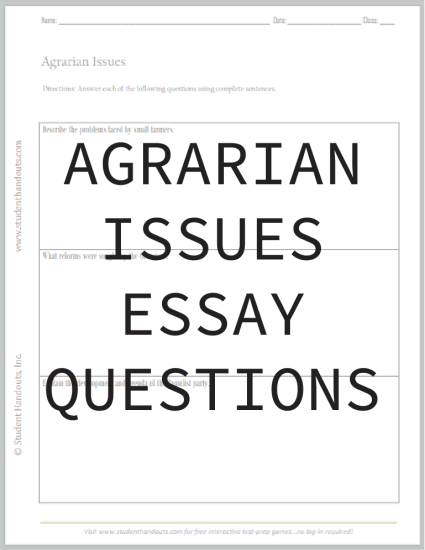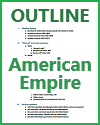| Agrarian Issues Essay Questions |
|---|
| www.studenthandouts.com ↣ U.S. History ↣ Discontent and Reform ↣ Progressive Era Worksheets |
 |
    |
|
Directions: Answer each of the following questions using complete sentences. (1) Describe the problems faced by small farmers. (2) What reforms were sought by the Grangers? (3) Explain the development and agenda of the Populist party. This free printable worksheet features three essay questions on the agricultural reform movement in United States history. Click here to print. Answers will vary. The Grange, officially known as the National Grange of the Order of Patrons of Husbandry, was a social and political organization founded in 1867 in the United States. It was primarily composed of farmers and aimed to address the economic and social challenges faced by rural communities, especially during the late 19th century. The Grange sought a variety of reforms to improve the lives of farmers and rural Americans. Some of the key reforms advocated by the Grangers included: Regulation of Railroads: The Grangers were concerned about the high transportation costs and unfair practices of the railroads. They lobbied for government regulation of the railroad industry to ensure fair rates and prevent discrimination against rural shippers. Regulation of Grain Elevators and Warehouses: The Grangers also sought government oversight and regulation of grain elevators and warehouses. They wanted to prevent monopolistic practices and ensure fair treatment for farmers storing and shipping their agricultural products. Cooperative Marketing and Purchasing: Granges established cooperative associations where farmers could collectively market their crops and purchase supplies at lower prices. This cooperative approach aimed to give farmers more bargaining power and reduce their dependence on middlemen. Rural Education: The Grange advocated for improved rural education, including the establishment of rural schools and the training of teachers. They recognized the importance of education in rural communities. Financial Reform: The Grangers supported financial reform measures, including the regulation of banks and currency, as they believed that access to affordable credit was essential for farmers. Political Activism: Grange members actively participated in politics to support their reform agenda. They lobbied state legislatures and Congress for legislation that would benefit farmers. Some Grangers even held political office. Granger Laws: In response to the Grange's advocacy, several states passed "Granger Laws" that regulated railroads, grain elevators, and warehouses. These laws varied from state to state but were generally aimed at addressing the economic concerns of farmers. The Grange movement was influential in addressing the economic and social challenges faced by rural Americans during a period of rapid industrialization and economic change. While the Grange itself declined in the late 19th century, many of the reforms they advocated for, such as railroad regulation, cooperative organizations, and rural education, laid the foundation for future agricultural and economic policies in the United States. |
| www.studenthandouts.com ↣ U.S. History ↣ Discontent and Reform ↣ Progressive Era Worksheets |














































